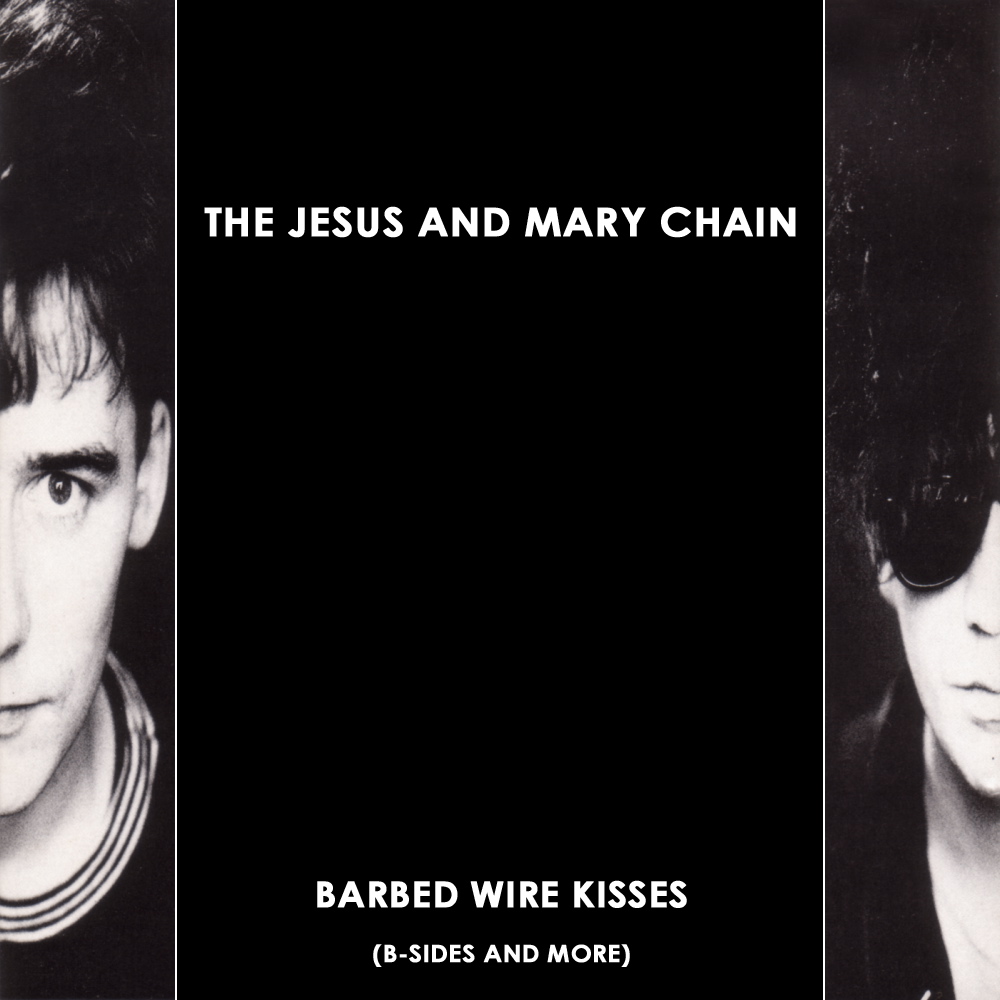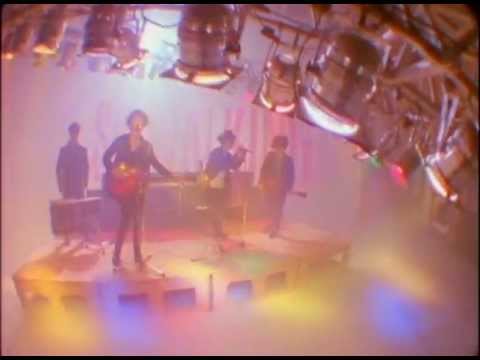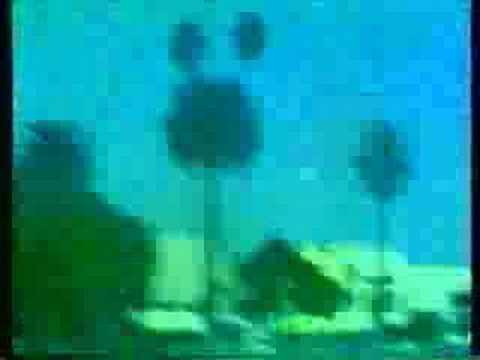I love Psychocandy, I adore Darklands and I’m also pretty crazy about the befuddlingly underrated 1998 album Munki, but it was the Jesus and Mary Chain’s Barbed Wire Kisses (B Sides And More) that came rushing out of the band’s canon to smite me good and proper. It was as if a deep layer of what the group had been creating up to that point (1988) had been revealed, cracked open like a box of shady, compelling delights, with this collection. Yes, we’d heard some of the tracks when we flipped over certain Mary Chain singles but here rarities also lurk, and there is something about hearing this selection of tracks together and as a whole that conjures up a thrillingly malevolent atmosphere that really is on another level. Barbed Wire Kisses lifts the stone and allows us to explore the dark world underneath. I kind of like it under there.
As it has come to pass that this collection of B-sides (and more) is 30 years old this month, it’s only right to reconsider and celebrate this release, which was granted Gold status in the UK and garnered glowing praise in the press, more glowing, in fact, than the reviews for some of the Mary Chain’s albums.
Fans would surely agree that a B-side care of the Reid brothers is often stronger than many other bands’ A-sides and, thanks to Jim and William’s determination to musically ‘out-do’ each other, particularly in later years, the tracks just became more arresting. The lack of pressure when recording these songs (they’re ‘only’ B-sides, after all) didn’t hurt either, as the stress the Reids suffered when recording an album just wasn’t there in the same way, allowing for a certain spontaneity, and a different kind of energy, to shine through. So, as Jim Reid observes, it would have been a shame, to say the least, to consign these tracks, ultimately, to obscurity.
Jim Reid: “We thought the B-sides should not just disappear because we thought they were pretty good. When you do an album, you’re basically shitting yourselves and you’re trying to get things just right, but sometimes what can happen is that you lose something because you’re too scared to take a chance. With a B-side, you just belt it out and there’s something kind of charming about it.
“We started to look at all the B-sides we had and we were thinking, ‘It would be terrible if these just got deleted and no one remembers these songs’, so we made sure they were on an album.”
“The B-sides were always a great thing,” says former Mary Chain bass-player / founding band member Douglas Hart. “Live we always would do a free-form of songs, and cover versions. It was a way to express ourselves in another way. Releasing them all as an album made total sense to me because it was another side of the Mary Chain, (but) to have the faith to release an album of B-sides which, to a lot of people, are just throw-aways. I can’t remember anyone else doing that.”
“To be totally honest,” Jim confesses, “the early B-sides we didn’t give a toss about. In fact, ‘Cracked’ was literally a track from Psychocandy, ‘The Living End’ I think, slowed to half-speed and with another vocal on it at the right speed! We just thought it was amusing. It got us out of jail, we needed a B-side, didn’t have one. But later, and not much later, we started to take B-sides quite seriously.”
‘Cracked’ might just be a reversal of ‘The Living End’ (a ghoulish tale of the swaggering, doomed biker, in love with himself, conjuring thoughts of the boyfriend character in The Shangri-Las’ ‘The Leader Of The Pack’), but its power cannot be underestimated. It worms its way under the skin. You almost feel as if you need psychic protection against it. It’s dark, muffled, fearful. Jim’s vocals are soft, hard to hear at first, before rising into a demonic, furious chant as William’s howling guitar slices through. That feeling of running in slow motion from something unseen in a nightmare? This is possibly the musical equivalent, and this unsettling mood prevails throughout the collection. ‘Everything’s Alright When You’re Down’ (the B-side to Darklands single ‘Happy When It Rains’) might have an upbeat, uncomplicated groove, but the darkness is there, largely thanks to the vocals, which end up sounding like someone being violently sick. It’s fantastic.
In the album credits of Barbed Wire Kisses is the name John Loder, a name that will be familiar to Mary Chain devotees. Loder was the engineer who ran Crass’s Southern Studios in North London, and he was instrumental to the Mary Chain sound simply because he left the group alone to do whatever they liked while he, according to the band’s erstwhile manager Alan McGee recalls, "went back to his office to smoke dope". This approach, or lack of one, was key to the band’s development. They didn’t really need a producer anyway, the Reids knew what they wanted.
“He just knew how to get a sound”, says John Moore, sometime Mary Chain drummer and guitarist and Quietus writer. “There would have been no ‘The needles [are] in the red!’ It would have been more, ‘If you blow it up, well, fuck it.’”
The tracks on this release span a time-frame that stretches back to the Jesus and Mary Chain’s pre-Loder / pre-Creation early 1980s, however, and the magical Portastudio demo of ‘On The Wall’ takes us directly back to Jim and William Reid’s bedroom in East Kilbride, where the brothers started their songwriting career – albeit slowly – and nurtured plans to foment their revolution. All in good time. ‘On The Wall’ was always a special track, and so, in true contradictory Jesus and Mary Chain style, they forgot all about it.
“‘On The Wall’,” ponders Jim Reid. “That was a classic Mary Chain shooting ourselves in the foot situation. We took that demo in to Rob Dickins (label boss at Warners). He raved about it. He was saying, ‘That’s a number one hit single!’ We just went away and, I don’t know why, but we just forgot it. We recorded the album without the track that the chairman of the company was raving about!
“It was later… ‘William, remember that song?’ ‘Yeah, kind of.’ That was it. I think at the time we thought we couldn’t do it justice, and we thought we would leave it and later get an orchestra in or something. That must have been it.”
‘On The Wall’ would eventually make it onto Darklands, but the demo version featured here is pure ‘80s alt-pop perfection as it is, a shining example of how the Reids were crafting unique pop gems years before they’d even left the cramped creative hub of their shared bedroom in a place that it probably isn’t unfair to call a cultural void ("Stonehenge with windows" according to Douglas Hart). Echoing, sparse chords turn towards and away from each other like moving figurines on a Black Forest clock. The vocals are expressive, honest, William’s guitar drones shimmer and the track concludes with dripping rainwater and moaning guitar wails that rise and fade. This is more than a demo, this is a window into the Mary Chain’s formative years and basically proof that they were fully formed long before they were ‘discovered’. There is no feedback here. It’s just pure, dripping, gloom-pop honey.
Also present on this release is ‘Upside Down’, the group’s debut single, recorded at Alaska Studios during a midnight session on borrowed gear (the Pastels’, according to then studio manager Pat Collier) and released on Creation in 1984. It still has the power to give the listener an intense case of the shivers from that first scream of feedback and the insouciant, octave-apart vocals and, what is perhaps an accidental Mary Chain hallmark in its contrasting nature, a combination of dark lyrics and black mood with a fast tempo and a melody in a major key.
Unlike the demos, this track reflects the Jesus and Mary Chain’s early live gigs and is drenched in the howling feedback that would become the group’s early trademark. Thrilling as it undoubtedly is/was to behold, it wouldn’t take long for the Reids to become irritated that the feedback was getting more attention than their songwriting – which is another reason why it is so great to hear their Portastudio demos such as the aforementioned demo of ‘On The Wall’. Any accusations of ‘gimmickiness’ have to dissolve immediately on being presented with their early songs just as they are, exposed and without a blanket of noise to mask them.
The stand-alone track ‘Sidewalking’, released in March 1988, also found a home on Barbed Wire Kisses. The Reids had been drawing on influences musically from the hip-hop scene in New York City, and sampled a drumbeat from Roxanne Shante’s ‘Roxanne’s Revenge’ for the track (which reached number 30 in the UK charts).
“It was my brother,” says Jim. “He’d had that song kicking about for a while. We got into hip-hop around that time, as almost everybody did, and we wanted to experiment with those kind of drum beats.”
John Moore: “I remember being there when they did ‘Sidewalking’, when they realised it was quite good, it wasn’t just a B-side, maybe it was something a bit better. It was an honour to see them work and also it was great because it demystified it. They’d write their songs on scraps of paper, and arrange them right at the last moment. The lyrics wouldn’t be finished until the vocal had to be done.
“That was incredible to me, I thought writing songs was such a precious thing and they had to be finished months in advance and then go past a committee and be stamped and then polished, then maybe taken apart … but no, it really was: pull it out of the air, stick it on a tape and then mix it. Might not work for everyone but it did for them. Which is why a song like ‘Sidewalking’ can just be done in an afternoon, just a riff and a beat and Jim extemporising over it.”
The Jesus and Mary Chain wear their influences on their sleeve: most obviously the Velvets, the Stooges, the Wall of Sound, surf music, and in the case of tracks such as ‘Sidewalking’, dance and hip-hop. But here we are also given an audience with their lesser-documented reverence of Bo Diddley, not least with the track ‘Bo Diddley Is Jesus’, which consists of that legendary Diddley beat augmented by a wailing siren and underscored by Jim’s malevolent whisper: ‘Head to toe I’m dressed in black’. As with so much of the group’s music, part of the genius is in the way it is mixed, the layers of guitars, layers of vocals.
The Mary Chain also include Diddley’s brilliant and oft-covered ‘Who Do You Love’ – as you’ve never heard it before, naturally. Lyrically this song is tres Mary Chain: ‘I walked 47 miles of barbed wire…’ not to mention the rattle-snake hide neck ties, chimneys made out of human skulls and the like. It’s suitably reptilian, hypnotic and sexual, and in this cover there is nothing out of place. Again, we have those layers and layers of shimmering sound, veering from soft and mesmeric to rasping, guttural, menacing.
With the greatest of respect to Brian Wilson et al, here resides my favourite version of ‘Surfin’ USA’, the Beach Boys’ rip-off of / ‘homage’ to Chuck Berry’s ‘Sweet Little Sixteen’. Bursting into life with the sound of breaking glass, it is a tribute to the Beach Boys in true Mary Chain-style. The Reids are masters of simplicity and contrast and they know when they don’t have to deviate, but still we have the echoing, silvery vocals, the jagged shard-like guitar, the driving bass that darken the crystal clear SoCal sky.
Of course, the Beach Boys homage is satisfyingly incongruous also because it’s quite hard to imagine the Mary Chain chaps surfing, or indeed entering into any kind of beach lifestyle at all. We saw them take glumly to the sands in the ‘You Trip Me Up’ video, clad reassuringly in leather, and on one trip to Hawaii in later years, Jim Reid and then bass-player Ben Lurie decided against taking a tour of the island, opting to spend hours in a cinema watching a film about it instead. This is the Jesus and Mary Chain. What did you expect? Giant inflatable bananas?
‘Kill Surf City’ (the B-side to ‘April Skies’) also subverts the surf, and this track, a total contrast to its hit flip-side companion ‘April Skies’, sits happily here amongst its demonic companions. Searing, crashing and explosive, it is led forth by devilish vocals that are seemingly unfurling upwards from the flames of hell, and the whole song generally makes you feel like something very, very bad’s about to happen, albeit in a very good way. While the Mary Chain’s take on ‘Surfin’ USA’ gives a respectful nod to the Beach Boys, ‘Kill Surf City’, as the title may hint, kicks sunshine well and truly up the arse and brings on a total eclipse. The final chords clang the door shut.
‘Hit’ is similarly Satanic, slinky, sick, confusing – again, there’s something very Mary Chain about major-key songs that are exhilaratingly frightening. The Marquis de Sade would probably have enjoyed this one. ‘You Trip Me Up’ B-side ‘Just Out Of Reach’ is blanket upon blanket of troubling sound, pierced with what sounds like a guitar being struck repeatedly by a gleeful maniac.
But there is softness here too, ‘candy’ counteracting the ‘psycho’; ‘Head’ (B-side to ‘Just Like Honey’) is warm, pretty but contrasted with glittering prickles of guitar, like sharp nails or glass breaking endlessly over an incantation, underpinned with fuzzy relentless bass.
‘Happy Place’ is also an unusually sweet-hearted pop track – it’s lighter, with lilting vocals, but still anchored by the unwavering 1-2-3-4 bass-line. Downstroke, always downstroke. Don’t get Douglas Hart started on this subject. Basically, should you be playing along with Jesus and Mary Chain records, there must, according to Mr Hart, be no limp wrists and no George Formby-esque ‘wanking’ rhythms, please.
The popworld-friendly ‘Don’t Ever Change’ displays the band’s range whilst retaining their simplicity and purity, but the track ‘Psychocandy’ is particularly special in its strange delicacy, not quite whispered vocals, beauty, warmth. There are no hard edges, unlike much of the brassy pop that dominated the charts at the time this track was born. This is a seductive combination of twinkling, hazy softness and a dark core of shattered glass and fire.
Barbed Wire Kisses couldn’t have been a more appropriate title for this release, which continues to sink its hooks into hearts in a way that’s hard to explain.
And, ultimately, what is the Mary Chain’s take on it? “It was all right,” breezes Jim. “We were happy with it.” Something of an understatement to our ears, perhaps, but the Mary Chain did always prefer to allow the music to speak (whisper, scream, howl) for itself.




